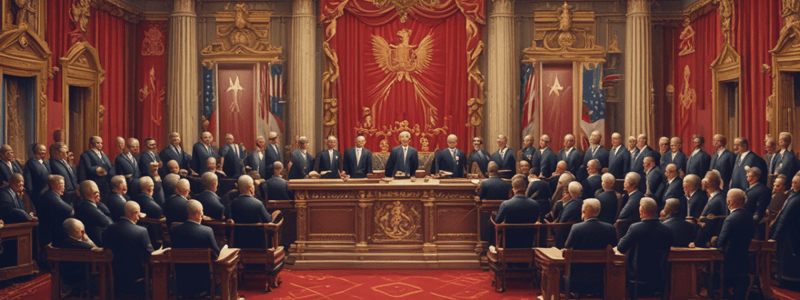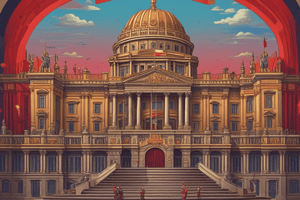Podcast
Questions and Answers
Which of the following is a characteristic of authoritarian regimes?
Which of the following is a characteristic of authoritarian regimes?
- Individual freedoms are unrestricted and guaranteed
- Competitive elections and robust civil liberties
- Political opposition is encouraged and celebrated
- Power is concentrated in the hands of a leader or small elite group (correct)
What is the main principle of socialism?
What is the main principle of socialism?
- Unrestricted free market capitalism
- Dictatorship of the proletariat
- Collective or governmental ownership of the means of production (correct)
- Private ownership of the means of production
Which of the following is a defining feature of a theocracy?
Which of the following is a defining feature of a theocracy?
- Freedom of religion is strictly enforced
- Religious groups hold power in the name of God or gods (correct)
- Separation of church and state
- Secular governance with no religious influence
Which type of authoritarian regime attempts to control every aspect of people's lives?
Which type of authoritarian regime attempts to control every aspect of people's lives?
Which of the following is an example of a theocracy based on a specific religion?
Which of the following is an example of a theocracy based on a specific religion?
Which economic system advocates for public enterprise and cooperatives?
Which economic system advocates for public enterprise and cooperatives?
Which of the following is NOT a type of monarchy mentioned in the text?
Which of the following is NOT a type of monarchy mentioned in the text?
What is the key difference between absolute monarchies and constitutional monarchies as described in the text?
What is the key difference between absolute monarchies and constitutional monarchies as described in the text?
Which of the following is NOT a characteristic of classical republics as described in the text?
Which of the following is NOT a characteristic of classical republics as described in the text?
What form of government is described as "systems where one person holds all executive powers in their hands"?
What form of government is described as "systems where one person holds all executive powers in their hands"?
Which of the following is NOT mentioned in the text as a type of government form?
Which of the following is NOT mentioned in the text as a type of government form?
Which of the following is a key characteristic of a theocratic government?
Which of the following is a key characteristic of a theocratic government?
Flashcards are hidden until you start studying
Study Notes
Forms of Government
Government forms are the structure through which political power is exercised within a state. These systems define how authority is distributed among different entities such as citizens, communities, regional areas, and centralized governments. In this article, we will discuss five main types of government forms: monarchy, classical republic, authoritarianism, socialism, and theocracy.
Monarchy
Monarchies are systems where one person holds all executive powers in their hands. This person could be a king, queen, emperor, empress, caliph, shahanshah, kaiser, magistros, grand prince, grand duke, archduke, viceroy, principe, hereditary statholder, or basileus. Historically, monarchies have been absolute, autocratic or constitutional. Absolute monarchies give complete responsibility to the monarch without any intervention from parliament or other external bodies. Constitutional monarchies allow parliaments to rule within certain boundaries set by law.
Classical Republic
Classical republics were mainly established during the period between ancient Rome's fall and Europe's Renaissance. They began with the city states that existed before the rise of national states. Examples of classical republics include Florence under the Medici and Venice under the Doge. Unlike modern democratic republics which involve universal suffrage and regular elections, classical republics were based more on representation, often limited to landowners.
Authoritarianism
Authoritarian regimes are characterized by noncompetitive elections and limited civil liberties, if they exist at all. Authority is concentrated in the hands of a leader or a small elite group who often have military backing. Political opposition is usually suppressed or silenced. There are two major types of authoritarianism: totalitarian and non-totalitarian. Totalitarian regimes attempt to control every aspect of people's lives, while non-totalitarian ones may tolerate some individual freedoms.
Socialism
Socialism refers to a system of society or group ownership and democratic management of the means of production and distribution of goods. It can also refer to an economic and social theory advocating collective or governmental ownership and administration of the means of production and distribution of goods. Socialism encompasses various ideologies and practices, including nationalization, public enterprise, cooperatives, syndicalism, and communism.
Theocracy
Theocracies are form[s] of government in which religious groups hold power in the name of God or gods. The ecclesiastical authorities exercise supreme legislative and judicial powers over both the secular persons and the affairs in their respective territorial jurisdictions. There are several types of theocracies, including those based on specific religions like Catholicism, Protestantism, Judaism, Sunni Islam, Shia Islam, or Sikhism, and those based on secular religions like the Church of Scientology.
Studying That Suits You
Use AI to generate personalized quizzes and flashcards to suit your learning preferences.




